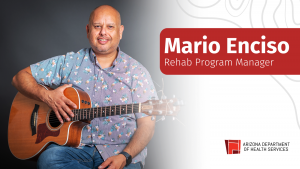 When Mario Enciso moved to Arizona from San Diego in 2011, he could not have known that he’d see his future each day as he drove between his downtown Phoenix apartment and his master’s level classes in music therapy at Arizona State University.
When Mario Enciso moved to Arizona from San Diego in 2011, he could not have known that he’d see his future each day as he drove between his downtown Phoenix apartment and his master’s level classes in music therapy at Arizona State University.
“I chose to live downtown because it was central,” he said. “On my daily trips to class I’d drive by the State Hospital and think, “I’m going to work there.”
Two years later, he did.
After working for a nonprofit organization that provided music therapy to teens and young adults, he joined Arizona State Hospital (ASH) in 2013 as a recreation therapist. He worked on the rehab team in the Arizona Community Protection and Treatment Center (ACPTC), which assists those with a history of sexual offenses.
In 2016 he was named manager of the ACPTC rehab department. It gave him an opportunity to lead the department into “a positive force to help residents succeed in all areas of life.”
Music therapy has been shown to have many treatment benefits for a variety of mental health conditions, including trauma, anxiety, and schizophrenia. Music can act as a medium for processing the patient’s emotions, trauma, or grief. It also can be helpful in regulating anxiety, improving heart rate, and stimulating the brain.
Interventions such as lyric analysis can provide a safe space to discuss emotions, thoughts, trauma, and other experiences. Songwriting provides residents with a creative outlet and a positive way to express emotions. Playing an instrument can help improve self image and provide a healthy outlet as well as a new coping skill.
Enciso says music therapy can be a powerful tool for fostering motivation and positive change in patients.
Becoming a music therapist requires more than simply playing a musical instrument. A degree in music therapy requires proficiency in guitar, piano, voice, music theory, music history, reading music, and improvisation, as well as skill in assessment, documentation, and other counseling and health care skills. Therapy students must complete a six-month internship and pass a certification exam in music therapy.
Enciso has found his dual roles as therapist and leader rewarding.
“I think it’s helped me grow in ways I never could have imagined,” he said. “While I still enjoy facilitating music therapy groups, most of my focus now revolves around my team and ensuring they love what they do so that they may continue helping our residents succeed.”
—
Note: ASH will host a job fair from 9 a.m. to 3 p.m. Wednesday, Nov. 2, at 501 N. 24th St., Phoenix. Career opportunities include nurses, psychologists, rehab therapists, social workers, and behavioral health technicians, among other opportunities. Walk-in interviews are available.










